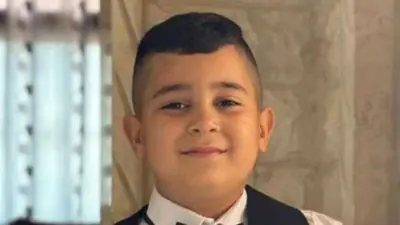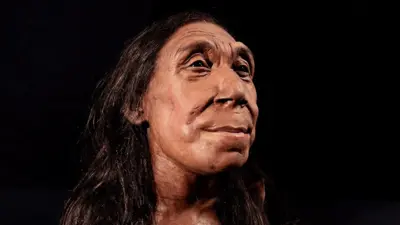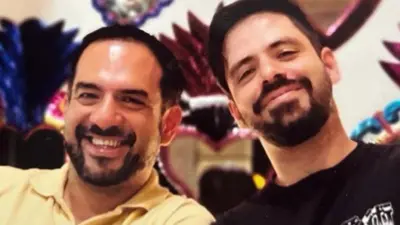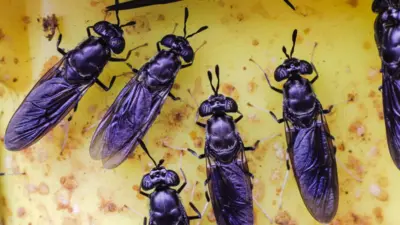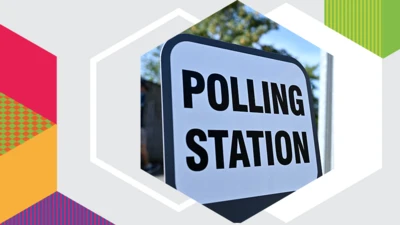We've updated our Privacy and Cookies Policy
We've made some important changes to our Privacy and Cookies Policy and we want you to know what this means for you and your data.
Venezuela power cuts: Blackouts hit Caracas and spread
Schools and workplaces in Venezuela have closed as an electricity blackout continues into a second day.
The power cuts, which started on Thursday afternoon, have been caused by issues at a major hydroelectric plant.
The government of President Nicolás Maduro has blamed the opposition, accusing them of sabotage.
It comes amid rising tensions over opposition efforts - backed by the US and some Latin American countries - to remove Mr Maduro from power.
Commuters in Caracas were plunged into almost complete darkness during rush hour on Thursday before the blackout extended to other areas.
The lack of electricity has caused flights to be diverted from the main airport in Caracas, from where thousands of workers were forced to walk home.
The problems stem from the Guri dam plant and have affected the telephone network and metro in Caracas.
State television on Friday said power had been restored in some parts of the capital.
However, local media reports say 15 of the country's 23 states have been affected by the blackouts, as well as Caracas.
Venezuela depends on its vast hydroelectric infrastructure, rather than its oil reserves, for its domestic electricity supply. But decades of underinvestment has damaged the major dams, and sporadic blackouts are commonplace.
Image source, EPA
Image source, EPA
Mr Maduro has accused opposition leader and self-declared interim president Juan Guaidó of trying to mount a coup with the help of "US imperialists".
Mr Guaidó said on Twitter that the blackout was a matter of "chaos, concern and anger" and "evidence of the usurper's inefficiency", adding that "light would return" once Mr Maduro was removed from power.
US Secretary of State Mike Pompeo also weighed in, blaming the "Maduro regime's incompetence".
"No food. No medicine. Now, no power. Next, no Maduro," he tweeted.
This article contains content provided by Twitter. We ask for your permission before anything is loaded, as they may be using cookies and other technologies. You may want to read Twitter cookie policy and privacy policy before accepting. To view this content choose 'accept and continue'.
End of Twitter content, 1
Blame game
By Will Grant, BBC News, Caracas
In a country where food is scarce and prices exorbitantly high for many ordinary people, there is currently a lot of food rotting and going to waste in switched-off fridges.
Venezuela has seen blackouts before, often. But few last as long or are as widespread as this one. The country's politicians - from President Nicolas Maduro to opposition leader, Juan Guaido - are blaming each other via Twitter.
The sense of confusion has only added to the growing stress for Venezuelans over the conflict in their country.
Why do blackouts happen in Venezuela?
Blackouts are nothing new in Venezuela. Critics say they have been getting worse since the nationalisation of the power grid in 2007. In 2016, the problem reached such a critical level that the government declared a 60-day nationwide state of emergency.
In an attempt to stem the country's chronic power shortages, the government has periodically enforced controlled blackouts, where they would switch the power off for up to six hours at a time.
Critics say that far from helping, this has caused perishable food to go bad and crime to run rampant. And when unplanned blackouts - such as the latest one - have happened, officials have blamed a number of different outside forces.
Last October, Electricity Minister Luis Motta Dominguez posted on Instagram that outages were caused by "animals such as rats, mice, snakes, cats, squirrels" getting into the hydroelectric system's substations - before adding that "of course iguanas are included".
This article contains content provided by Instagram. We ask for your permission before anything is loaded, as they may be using cookies and other technologies. You may want to read Instagram cookie policy and privacy policy before accepting. To view this content choose 'accept and continue'.
End of Instagram content, 1
A few months earlier another senior official, Lisandro Cabello, said the power cuts were caused by the country's position near the Equator. He said the fact that "we are very close to the Sun" means more intensive use of power in Venezuela than in other countries.
What's the background to the political crisis?
Mr Maduro took over the presidency when his late mentor Hugo Chavez died in 2013. In recent years Venezuela has experienced an economic collapse, with severe food shortages and inflation reaching at least 800,000% last year.
The Maduro government is becoming increasingly isolated as more and more countries blame it for the economic crisis, which has prompted more than three million people to leave Venezuela.
Mr Guaidó, who leads the opposition-controlled National Assembly, declared himself interim president on 23 January and has been at loggerheads with President Maduro ever since.
He has been recognised as interim president by more than 50 countries but Mr Maduro retains the support of his close allies Russia, Cuba and China, among others.
Top Stories
Features & Analysis
Most read
Content is not available
